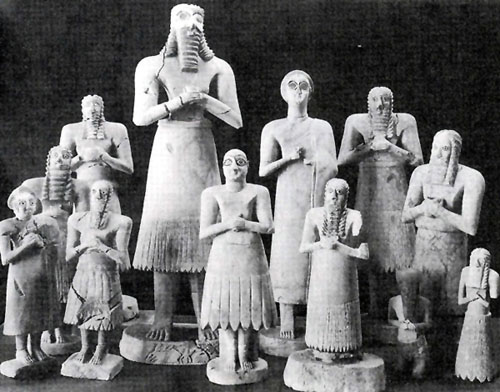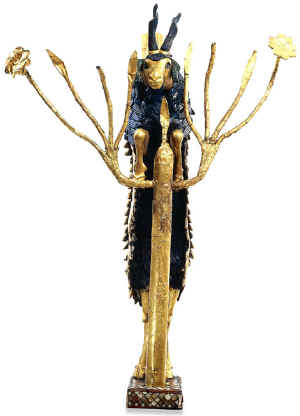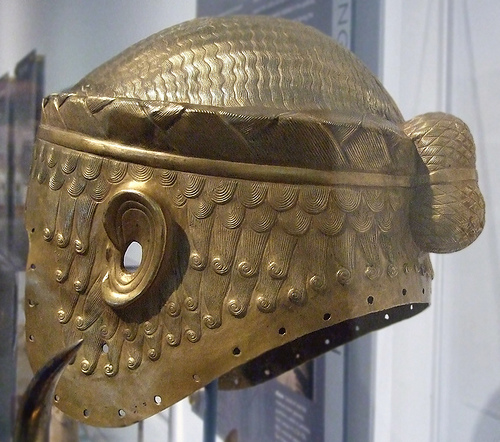The Sumerians stood in awe of their gods, whom they conceived as dwelling in the forces of nature- which might capriciously destroy men- as well as in man-made temples and figurines- where they might be cajoled into acting as humanity’s protectors. The Gods were a mixed blessing; part burden and nuisance yet capable of fulfilling the role of insurance policy.
Whispers in the wind
Tell of what is meant to be
In the Land between two Rivers
Something is calling me…

The group of statues above, found together in the ruins of a temple, are believed to represent a god and goddess- the tallest pair- in confrontation with human worshippers.
The god of each city was looked upon as its owner, so that the Sumerian was a tenant as well as a servant of the divinity. In return for human labor, the god was supposed to warn off malignant events. Like the poorest fisherman, the city’s king was regarded as a servant of the gods.
…Tonight beside the Cypress Tree
We hear the night birds sing.
Voices in the desert winds, say,
Experience me.
Exotic treasures
Mysterious pleasures
Calls to me like an oasis
Mesapotamia!

In the inlay panel above, the pleasures of peaceful life are sustained by a procession pf abundance; men bearing fish from the river, carrying bales of grain, tending wooly sheep, driving asses and oxen. Yet the Sumerians knew too, that abundance was a gift the Gods could snatch away, and in a sense that is what happened because by 2000 B.C. the yields had become meager.
The Sumerians clearly understood that their civilization rested on the fruits of the earth. By 2000 B.C. , wheat, once used on Sumerian seals as an indication of prosperity, had almost ceased to grow in the saline, worn out soil.
” The flooding of the Tigris and the Euphrates, on the other hand, was violent and irregular, hence the mental life of the Mesopotamian civilizations became dominated by a sense of anxiety. The world was unpredictable and capricious, bringing life-giving rain and fertility one day and devastating destruction the next. Since the forces of nature were expressions of the whims of the gods, the gods were also unpredictable and capricious. Rather than the high estate which the Hebrews assigned to man as the representative of God on earth, for the inhabitants of Mesopotamia man was nothing more than the slave of the gods, designed to relieve them of their toils and subject to their whims. ”

"These words from the Book of Genesis echoed in the mind of Leonard Woolley when he discovered the 'Great Death Pit' at Ur, the city where Abraham lived before he traveled to Canaan. In the pit he found a pair of statuettes, gold and lapis lazulae, dating from about 2600-2400 BC, or what looked like a goat or ram caught in the branches of a golden bush. Woolley thought there might be a connection between these objects and the story of Abraham and Isaac. Judging by the horns and coat of the animal in the statuette, it is more likely to have been a goat - an animal noted for its endurance and sexual potency."
In 1922,Leonard Woolley discovered at Ur one of the Sumerians most spectacular treasure-troves. There, under a rubble heap, lay sixteen royal tombs, built at the base of deep pits. In each pit were neat rows of bodies; one held the remains of sixty-eight women- court musicians with their instruments, among which was the bull’s head harp shown below. It is possible the women accompanied their ruler to the tomb and then took their own lives with poison. Perhaps it is some consolation to note that at least the wasteful practice of human sacrifice had been abandoned.

"Planners at Centcom, we are told, were aware of the threat of war to Iraq's cultural heritage. Apparently in planning the bombing campaign, they took special precautions to avoid hitting key sites. Yet they seem not to have considered the risk of looting. Perhaps they believed that Iraqis would respect the value of their heritage that none would consider stealing it. If so, they were clearly seriously off the mark. They were happy to allow the looting of Saddam's palaces and ministries; they should have anticipated that things would spiral out of control. Many Iraqis saw museums (and even hospitals) as official buildings, intimately linked to the ruling Baathists. In addition, many of the stolen artifacts owe their provenance to ancient Assyrian and Sumerians, who are not the direct ancestors of the majority Arab population of present-day Ira
he looters seem to have had no qualms about stealing and selling their artifacts. "Read More:
http://www.historywiz.com/galleries/standardofur.html
http://worldhistory1a.homestead.com/SUMERIA.html
http://www.bible-archaeology.info/abraham.htm
Ultimately, its a complex matter to comprehend this mysterious people known as the first civilization. Their ambiguous relation to their gods seems exemplified by through the ethical implications of the curses found in Psalm 137:
“Psalm 137 opens with lament and closes with one of the most strident imprecations in the Psalter. Read against the backdrop of the Babylonian exile, the imprecation incorporates both Edom and Babylon, concluding with the words “Happy shall they be who take your little ones and dash them against the rock.” The closing verses have proven to be problematic for commentators. The tension
is well expressed by R. Clifford, who states “Psalm 137 has the distinction of having one of the most beloved opening lines and the most horrifying closing line of any psalm…
Addendum:
(The Ram in the Thicket): The animal’s head and legs were covered in gold leaf, its ears were copper, its twisted horns and the fleece on its shoulders were of lapis lazuli and its body fleece made of shell. Its genitals are gold, suggesting they were an important feature of the symbolism behind this cult object.
“The destruction of Iraq’s treasures under Saddam did not stop with the end of the first Gulf War, as this report by Kevin Tibbles of NBC on 19 February 1999 makes clear: ‘During the Gulf War, priceless Babylon artifacts were removed for safekeeping from the Iraqi Museum in Baghdad. The items have since disappeared, and display cases sit dark and empty … Prior to the Gulf War in the early 1990s, [Professor John Russell of the Massachusetts College of Art] helped excavate the ancient city of Ninevah in northern Iraq. He documented what he found. Recently, an Iraqi friend sent him photographs of the same site, showing that all of its priceless historical beauty had been stolen. “History is being erased, with no possibility of being recovered,” Russell says. “In a sense, it is a total war against the past.”‘ (my italics)
Were the display cases in the Baghdad Museum brim full of treasures until the moment Saddam stared up into the sky at the nose-cone of his personal J-DAM (or the moment he settled into the seat of his Syria-bound limo, or skipped down the steps to whatever bunker he is now holed up in)? Unlikely.
In addition, much of the looting seems to have been premeditated. It is suspicious that looters seem to have ignored reproductions to focus on the most valuable, genuine antiquities. It is suspicious too that the vaults of the museum were emptied without damage to their massive doors, suggesting either that antiquities were taken to safety before the fall of Baghdad, or that looters had long planned their raid and had received help from insiders. ”







 COMMENTS
COMMENTS
you are so cool dave – yes this was a premeditated act to get “something” in Iraq
the Goddess Astarte came to me on a massive hit of cocaine over 30 years ago and since then
lets just say “our vision is dimensional” and “we return for a reason” – the waters of Babylon – where we touched down – when we remember Zion – the portals are opening! i wish u a merry Mary from upside-down the world in buenos aires peace and love erica snowlake
thanks so much for reading Erica! It seems fuzzy, but there is something “there” so to speak. You be well and have a good holiday while we freeze up North. Best